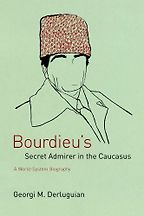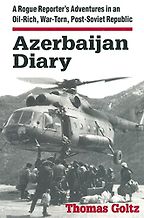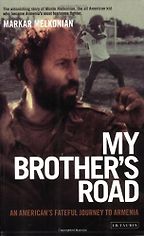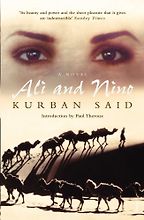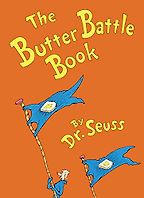Tell me about Bourdieu’s Secret Admirer in the Caucasus. Great title.
Well, it’s quite a mouthful, isn’t it? I think the title of the book probably puts off a lot of people who would otherwise be very interested in it. Georgi Derluguian is a fascinating man. He’s an Armenian from the North Caucasus who worked in Africa in Soviet times as an interpreter. He’s a sociologist who then emigrated to Chicago, so he’s got this amazingly sophisticated understanding of the sociology of the post-Soviet space, but also he gets around and actually goes to these places – Chechnya, Abkhazia, Karabakh – and he’s a local as well, so the combination of those characteristics means this is really the best book at unpacking and disentangling what happened in the Caucasus at the end of the Soviet period.
He’s chosen as his main protagonist this extraordinary character who is the secret admirer of Pierre Bourdieu, the French sociologist and thinker. His only fan in the Caucasus is this chap, a nationalist originally called Yuri Shanibov, but who renamed himself Musa Shanib. Shanib is from Kabardino-Balkaria. We get this biography about his life trajectory, how he started in the Communist party, then became a dissident, then briefly became a nationalist hero, then got marginalised by everyone else and is now pretty much on his own again.
Georgi uses this story as his thread, but the bigger canvas is a very interesting theoretical explanation about how the Soviet Union ended the way it did. Back in the 70s and 80s a lot of Western scholars argued that the Soviet Union was a prison house of nations and that if it did ever end there would be an uprising against ethnic Russians and Uzbekistan might be the place where it would happen. But, in fact, it happened in a very different way. Some of the most loyal nationalities, like the Armenians, were the first to rise up, but they rose up not against Russians but against their neighbours. Very different things happened which people hadn’t expected and this book really explains how Soviet society broke down in terms of competition for resources and in terms of nationalities. He also talks about the groups who didn’t fit into the Soviet economy. He calls them the sub-proletariat and they were the kind of criminalised class that then became the fuel for conflict in the Caucasus. It’s a rich book and it’s a great read that deserves a much wider readership.
We’ve got Thomas Goltz next.
Thomas Goltz is another extraordinary character. He’s an American journalist who was living in Turkey and spoke Turkish, and almost by accident ended up in Azerbaijan in 1991. To my mind this is the best on-the-ground inside account of what it was like to live in the margins of the Soviet Union as it broke up. We’ve got a lot from Moscow in that period, where there was still this veneer of civilised political discourse, but once you got out to the fringes you realised that actually it was much more about the desperate scramble for the spoils of the Soviet Union and extraordinary battles for power. I think Azerbaijan must have had the most bizarre battles of all. It had this war with Armenia over Nagorno-Karabakh and then it had all these internal battles. At one point there were three coups or counter-coups in a week. Goltz was there and he knew all the characters and he saw the Karabakh war from the Azerbaijani side close up. He doesn’t buy into any of the ‘transition to a market economy’ or any of the nice little models that most journalists were using. He writes in a totally direct fashion and has this sort of Hunter S Thomson style of the heavy-drinking, fast-living journalist in Azerbaijan. This is a small classic.
Doesn’t Azerbaijan Diary include the account of a massacre that he alone witnessed?
One of the themes running through Goltz’s books is that foreign editors have a very narrow agenda and ignore important stories that fall outside it. Goltz was the first witness to all these Azerbaijani refugees coming out of the town of Khojali where there’d been a massacre by the Armenians. He and a couple of other people saw what was happening and desperately tried to alert the world media but initially got a brush-off because it didn’t fit with the news agenda the editors had. Eventually it did get out and became a big story, and that whole Khojali story has become a central part of the national narrative of modern Azerbaijan. It was a great mobilising factor for Azerbaijanis to go to war. Goltz gives you the blow-by-blow account of how it all happened – and it doesn’t reflect on anyone, on either the Armenian or Azerbaijani side.
My Brother’s Road.
This really looks at the other side. The weakest part of Goltz’s book is that he makes only one trip to Armenia and it’s a very unsatisfactory chapter, so this is the other side of that war over Nagorno-Karabakh – which I myself have written a book on. This is an extraordinary read and it tells you the similarities and yet the differences between the Armenians and the Azerbaijanis.
Just to give you some background, Markar Melkonian is the brother of this romantic warrior/scholar/terrorist, a Californian/Armenian archaeologist, who adopted the nationalist cause. He went to Lebanon and joined an Armenian terrorist group where he was responsible for murdering a Turkish diplomat and killing his daughter by mistake. He was a man with blood on his hands but also an extremely intelligent and, in his own way, incredibly principled man. He went off to Karabakh and was outraged by the corruption among the local Soviet Armenians. Anyway, he eventually got killed and his brother, Markar, wrote this unvarnished biography. Markar Melkonian doesn’t leave out any of the bad stuff, though obviously we get the heroic side. We see that on the Armenian side there was this Soviet, corrupt, fratricidal element to the conflict, but also there was an extra element, which was the worldwide Armenian nationalism that was people projecting the suffering of their grandparents at the hands of the Turks into this war against the Azerbaijani people. It was one of the things that actually helped the Armenians win.
Ali and Nino.
It’s a bit of a classic. The Romeo and Juliet of the Caucasus. There’s actually a very interesting book by Tom Reiss about the author, who was a Baku Jew called Lev Nussimbaum.
Isn’t that disputed?
No, not any more. Tom Reiss got hold of original manuscripts and absolutely nailed it. Anyway, Nussimbaum converted to Islam and went to live in Germany in the 1930s and wrote some other books under the name Essad Bey, but this is by far his best book. And it’s this incredibly vivid (he uses caricature but it never becomes cartoon) novel about the Caucasus before the First World War, and you’re reminded that what happened in the 90s was a sort of repeat of what happened in the period between the First World War and the Bolshevik re-invasion of the Caucasus in 1920 – ethnic conflict, chaos, breakdown and foreign intervention. But then you’ve got the love story between Ali, the Azeri Muslim, and Nino the Georgian and how they come from two different worlds but how their worlds meet in the city of Baku, this cosmopolitan city.
When did it stop being cosmopolitan?
Baku was always vulnerable to conflict and conflict tore it apart in that era. It managed to get back together again in the Soviet era but then the war with the Armenians happened in 1990 and the Armenians, Russians and Jews all left. It has lost its cosmopolitan feeling over the past 20 years. But the thing about Ali and Nino is that every page has its laugh out loud delights: the stereotype of the Georgian cousins who try to kill you with their hospitality and the Armenian who drives over a bridge and says: ‘This bridge was built by my ancestors and Alexander the Great drove over it.’ And Ali looks at the inscription and it says, ‘Built in 1880’. No one gets off lightly. It’s a sheer delight.
The Butter Battle Book.
I was reading this to my daughter and I suddenly realised it should be compulsory bedtime reading for all children in the Caucasus because it’s actually about ethnic conflict. Well, it’s more explicitly about the Cold War, but I read it through my Caucasian lens. It’s about the Yooks and the Zooks and it’s about 20 pages long.
Read me a couple of lines.
On the last day of summer, ten hours before fall…
my grandfather took me out to the wall.
For a while he stood silent. Then finally he said,
with a very sad shake of his very old head,
‘As you know, on this side of the wall we are Yooks.
On the far other side of this wall live the Zooks.’
Then my grandfather said, ‘It’s high time that you knew
of the terribly horrible thing that Zooks do.
In every Zook house and in every Zook town
every Zook eats his bread with the butter side down!’
Then the Yooks and the Zooks get into this conflict, and it’s generally true about what Freud called the narcissism of minor difference – that people end up in conflict with people who are only marginally different from themselves. Yooks and Zooks could be Georgians and Abkhazians or Armenians and Azeris, who actually have so much in common. They adopt this bizarre identity and historical arguments to prove hatred for one another when in reasonable times they get along fine.
That’s the trouble though. Even if they read this they’d forget about it in unreasonable times.
Well, I think most of the time they are aware that they have a lot in common, but for political reasons they can be manipulated and a bit of satire might help remind them of their better instincts.
Five Books aims to keep its book recommendations and interviews up to date. If you are the interviewee and would like to update your choice of books (or even just what you say about them) please email us at [email protected]
Five Books interviews are expensive to produce. If you've enjoyed this interview, please support us by donating a small amount.
